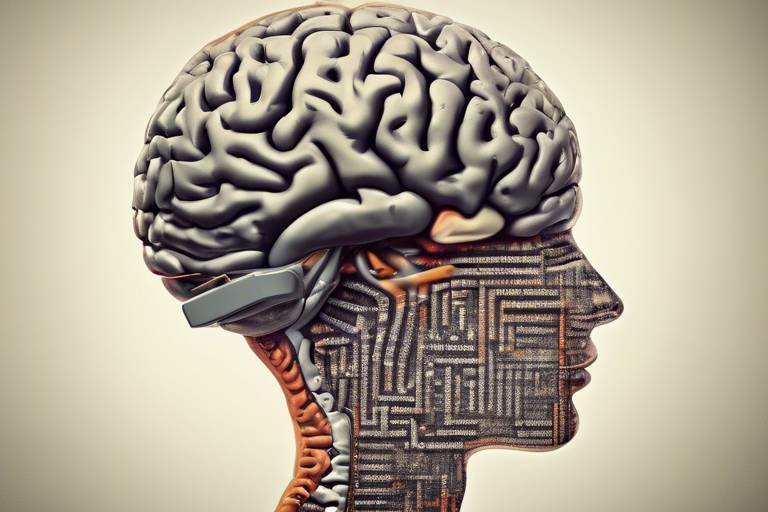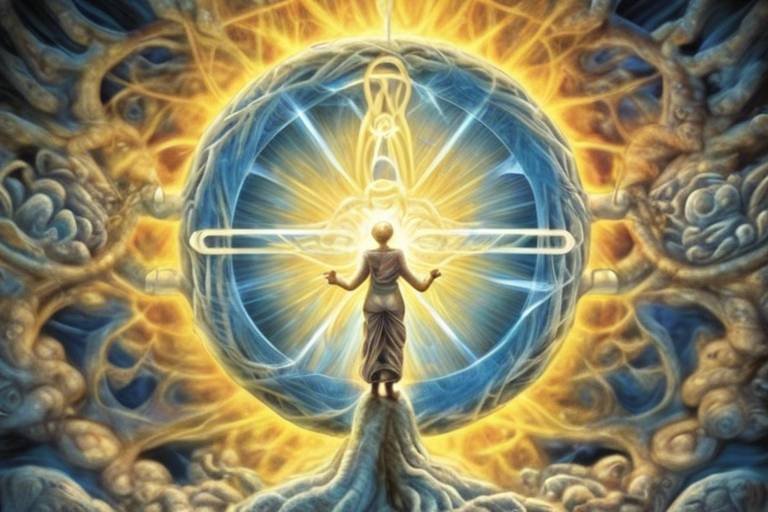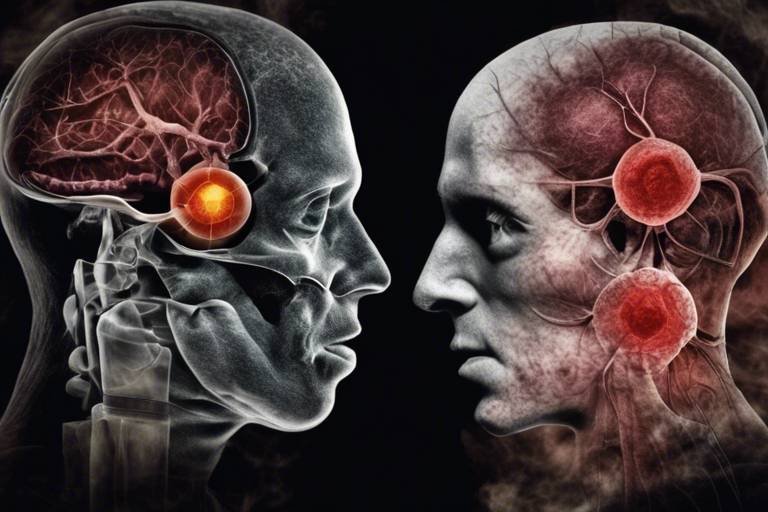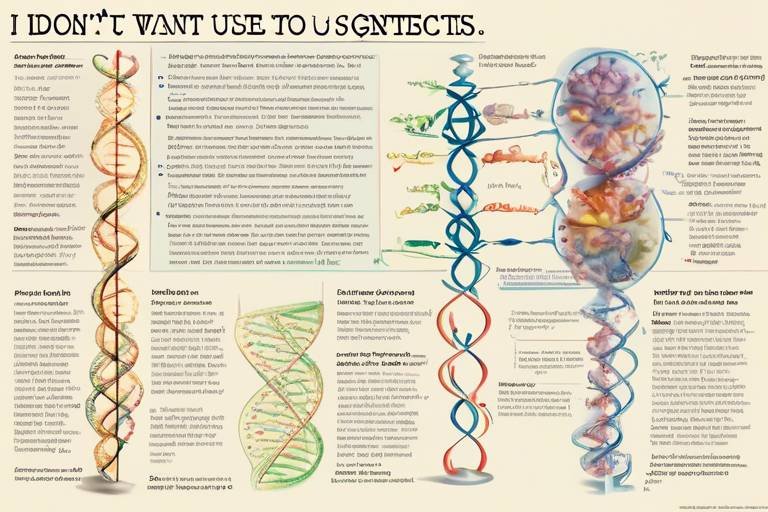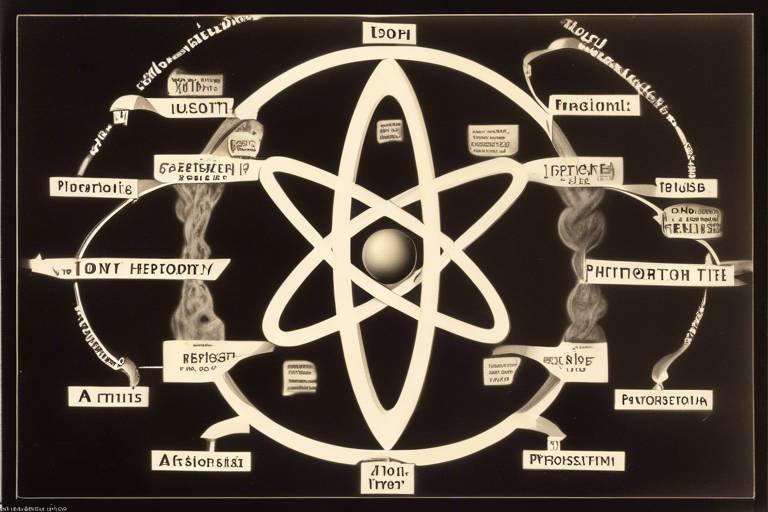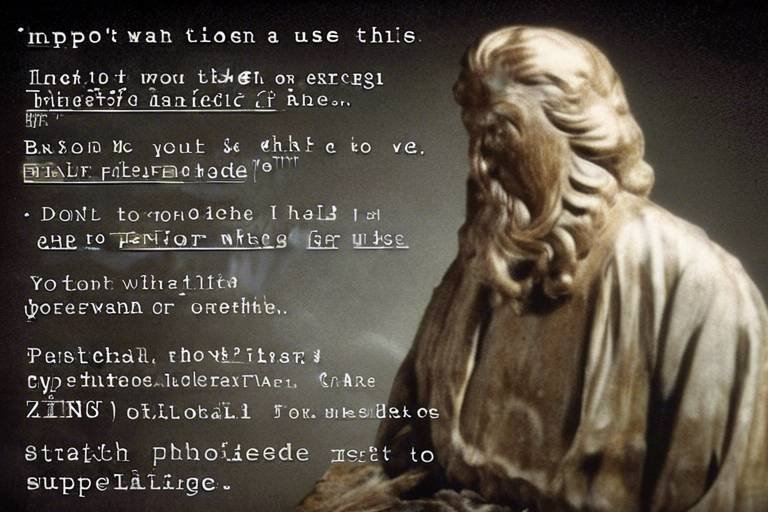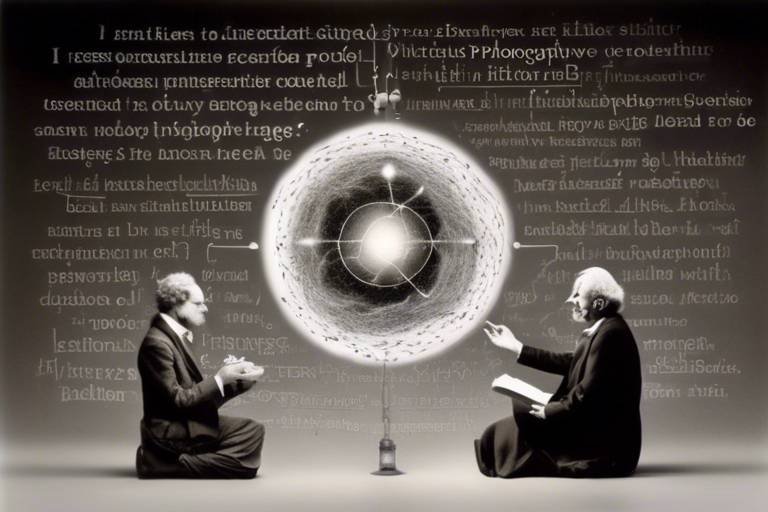The Philosophy of Limitations and the Infinite Universe
This article explores the intricate relationship between human limitations and the boundless nature of the universe, examining philosophical perspectives and implications for understanding existence and our place within it.
Limitations are inherent to the human experience, shaping our understanding of reality. They can be seen as the walls that define our existence, yet they can also act as the very canvas on which we paint our lives. Imagine trying to create a masterpiece without any boundaries; the chaos might overshadow the beauty. Limitations help us focus our energies and give structure to our aspirations. Philosophically, these constraints can lead to profound insights about our nature and existence. For instance, when we confront our limitations, we often discover strengths we never knew we had. This exploration of limitations is not merely about what we cannot do; it’s about what we can achieve within those confines.
The universe is often described as infinite, presenting a paradox to human understanding. How can we, as finite beings, grasp something that is boundless? The concept of infinity challenges our perceptions and stretches our imaginations. It invites us to ponder profound questions: Is the universe truly infinite, or are there boundaries we have yet to discover? This section examines the concept of infinity in the universe and its implications for philosophy, science, and spirituality. The notion of an infinite universe can be both exhilarating and daunting. It suggests endless possibilities, yet it also reminds us of our smallness in the grand scheme of things.
Various philosophers have explored the nature of limitations, arguing that they can be both constraining and liberating. For example, Friedrich Nietzsche posited that limitations can drive individuals to create meaning in their lives. Instead of viewing limitations as mere obstacles, he encouraged a perspective that sees them as opportunities for growth. This section discusses key philosophical viewpoints on how limitations shape human experience and thought, illustrating that our constraints often fuel our creativity and resilience.
Existentialist thinkers emphasize individual freedom within the constraints of existence. They argue that while we may face limitations imposed by society, biology, or circumstance, it is our responsibility to create our own meaning. This subsection explores how existentialism addresses the tension between limitations and the search for meaning in an infinite universe. The existentialist perspective encourages us to embrace our limitations as integral to our journey, suggesting that it is within these confines that we discover our true selves.
Eastern philosophies often embrace limitations as part of the natural order. For instance, in Buddhism, the concept of impermanence acknowledges that everything is transient, including our limitations. This part examines how traditions like Buddhism and Taoism perceive limitations and their role in achieving harmony with the universe. Rather than resisting limitations, these philosophies teach acceptance and understanding, suggesting that by recognizing our constraints, we can find peace and balance in our lives.
Human experiences are deeply intertwined with our limitations. From our physical abilities to our emotional resilience, limitations shape our ambitions, relationships, and understanding of the universe's vastness. When faced with challenges, we often discover our capacity for growth and adaptation. This section reflects on how these limitations influence our daily lives, reminding us that they are not merely barriers but also opportunities for learning and self-discovery. In many ways, our limitations define us, guiding our choices and shaping our identities.
The relationship between science and philosophy sheds light on the limitations of human understanding. As we delve deeper into the mysteries of the universe, we often encounter questions that challenge our philosophical views. This section discusses how scientific discoveries challenge and expand our philosophical views of the universe, illustrating that the pursuit of knowledge is a journey filled with both revelations and uncertainties.
Scientific advancements have transformed our comprehension of infinity. Mathematics, particularly in the realm of calculus and set theory, provides tools to conceptualize the infinite. Meanwhile, cosmology reveals the vastness of space and time, challenging our notions of a finite universe. This subsection explores how mathematics and cosmology contribute to our understanding of the infinite universe and its philosophical implications. As we learn more about the cosmos, we are reminded of the limits of our understanding and the infinite possibilities that lie beyond.
New scientific findings often provoke philosophical inquiry. For example, the discovery of black holes forces us to reconsider our understanding of space and time. This part discusses how discoveries in physics and cosmology challenge traditional philosophical notions of limitations and the infinite. As science pushes the boundaries of what we know, it invites us to rethink our place in the universe and the significance of our limitations.
- What are limitations in the context of human existence?
Limitations refer to the constraints we face in various aspects of life, including physical, emotional, and societal factors that shape our experiences and choices. - How does the concept of infinity challenge our understanding?
The concept of infinity presents paradoxes and questions about the nature of the universe, prompting philosophical and scientific inquiry into our existence and place within it. - Can limitations be beneficial?
Yes, limitations can foster creativity, resilience, and personal growth by encouraging individuals to find solutions and push their boundaries. - What role does philosophy play in understanding science?
Philosophy helps us interpret scientific discoveries and their implications, guiding our understanding of existence, knowledge, and the universe.

The Concept of Limitations
Limitations are an intrinsic part of the human experience, shaping not only our understanding of reality but also our very existence. They can be seen as the walls that define our world, yet paradoxically, they are also the windows through which we view our potential. Think about it: without limitations, would we even recognize our capabilities? Limitations force us to navigate through challenges, fostering growth and resilience. They push us to think creatively and innovate, leading to breakthroughs that might not occur in a limitless environment.
Philosophically, limitations can be viewed through various lenses. They can be constraining, acting as barriers that hinder progress and exploration. On the other hand, they can be liberating, providing a framework within which we can operate and thrive. This duality is what makes the concept of limitations so fascinating. For instance, consider the limitations of time. While it may seem like a restriction, it also encourages us to prioritize our goals and make meaningful choices. In this way, limitations can help us focus on what truly matters, guiding our actions and decisions.
Moreover, limitations are not just personal; they are societal and cultural as well. As we engage with the world around us, we encounter various limitations imposed by social norms, laws, and even our own beliefs. These external limitations shape our perceptions and influence our behavior. They create a shared reality, a collective understanding of what is possible and what is not. This interplay between personal and societal limitations is crucial in shaping our identities and experiences.
In a broader sense, limitations can also lead to a deeper understanding of existence itself. They compel us to ask profound questions: What does it mean to be human? How do we find meaning in a world that often feels constrained? By grappling with these limitations, we can gain insights into our place in the universe. It is through the acknowledgment of our limitations that we can begin to explore the infinite possibilities that lie beyond them.
In conclusion, the concept of limitations is multifaceted, encompassing personal, societal, and existential dimensions. They are not merely obstacles to overcome but are integral to the human experience. By embracing our limitations, we can unlock new pathways to understanding ourselves and the universe around us. In this journey, we discover that limitations can lead to profound insights and, ultimately, to a richer, more meaningful existence.
- What are some examples of limitations in everyday life? Limitations can include time constraints, financial restrictions, and societal expectations. Each of these factors can influence our decisions and opportunities.
- How can limitations be beneficial? Limitations can foster creativity and innovation by forcing individuals to think outside the box and find alternative solutions to challenges.
- Are limitations the same for everyone? No, limitations can vary widely among individuals based on personal circumstances, cultural backgrounds, and societal structures.
- Can embracing limitations lead to personal growth? Absolutely! Acknowledging and working within our limitations can lead to resilience, self-awareness, and a clearer understanding of our goals and aspirations.

The Infinite Universe
The concept of the universe as infinite is both awe-inspiring and perplexing. Imagine standing on a beach, gazing out at the endless horizon where the ocean meets the sky. In that moment, you can grasp the vastness of the sea, yet you know it extends far beyond what your eyes can see. Similarly, the universe stretches beyond our comprehension, challenging our understanding of existence itself. This infinite nature raises profound questions: What lies beyond the observable universe? Are there realms of existence that we have yet to discover? These questions are not just scientific inquiries but also philosophical explorations that push the boundaries of human thought.
In the realm of science, the universe is often described as expanding, with galaxies moving away from each other at incredible speeds. This expansion suggests that the universe has no definitive edge, which leads us to consider the implications of infinity. When we think of infinity, we might picture an endless number line or a never-ending sequence of events. Yet, in the context of the universe, infinity takes on a more complex meaning. It challenges our perception of time, space, and even our own existence. Are we merely specks of dust in an infinite cosmos, or does our consciousness hold significance in the grand scheme of things?
Philosophically, the infinite universe presents a paradox. On one hand, it can evoke feelings of insignificance, making us question our purpose and place in the cosmos. On the other hand, it can inspire a sense of wonder and curiosity, driving us to seek knowledge and understanding. This duality reflects the human experience—our limitations often shape our perceptions, yet the infinite possibilities of the universe encourage us to transcend those limitations.
To better understand this relationship between limitations and the infinite universe, we can consider the following aspects:
- Cosmological Models: Various models, such as the Big Bang theory and the multiverse hypothesis, offer insights into the nature of the universe and its infinite characteristics.
- Philosophical Inquiry: Philosophers have long debated the implications of an infinite universe, questioning the nature of reality and existence.
- Spiritual Perspectives: Many spiritual traditions view the infinite universe as a reflection of the divine, suggesting that our limitations are part of a greater cosmic plan.
As we delve deeper into the infinite universe, we begin to recognize that our understanding is shaped not only by scientific discoveries but also by our philosophical inquiries. The interplay between science and philosophy illuminates the limitations of human understanding while simultaneously expanding our horizons. Just as a child gazes up at the stars, filled with wonder and questions, so too must we embrace the mystery of the infinite universe, allowing it to inspire us to explore the unknown.
- What is the infinite universe? The infinite universe refers to the idea that the universe has no boundaries and extends indefinitely in all directions.
- How does the concept of infinity impact our understanding of existence? Infinity challenges our perceptions of time, space, and our place within the cosmos, prompting philosophical inquiries about meaning and purpose.
- What are some philosophical implications of an infinite universe? An infinite universe raises questions about significance, existence, and the nature of reality, often leading to discussions about human limitations and potential.

When we dive into the realm of philosophy, the concept of limitations often emerges as a double-edged sword. On one hand, limitations can feel like chains binding us, restricting our potential and curtailing our dreams. On the other hand, they can serve as a canvas for our creativity, pushing us to innovate and adapt. Various philosophers have tackled this paradox, offering insights that resonate through the ages. For instance, the ancient Greek philosopher Plato suggested that limitations are not merely obstacles but rather essential components of the human experience. He posited that our understanding of the world is shaped by the shadows of reality, which are cast by the limitations of our perception.
Another significant figure in this discussion is Immanuel Kant, who argued that our knowledge is confined to the phenomena we can experience, leaving the noumena—the things in themselves—forever beyond our grasp. This limitation of knowledge doesn't imply a failure; rather, it highlights the profound nature of our existence. Kant's perspective encourages us to embrace our limitations as a pathway to greater understanding, suggesting that acknowledging what we cannot know can lead us to deeper insights.
Furthermore, the existentialist philosophers, particularly Sartre and Camus, delve into the tension between freedom and limitation. They argue that while we may be constrained by circumstances, it is within these very constraints that we find our freedom. Sartre famously stated, "Man is condemned to be free," implying that our limitations are what compel us to make choices and define our essence. In this light, limitations transform from mere hindrances into opportunities for self-discovery and authenticity.
In contrast, some Eastern philosophies, such as Buddhism and Taoism, embrace limitations as a natural aspect of life. They teach that acceptance of our limitations can lead to harmony with the universe. According to Buddhist teachings, the acknowledgment of suffering and impermanence is crucial for achieving enlightenment. In this sense, limitations are not to be resisted but rather embraced as part of the journey toward understanding the true nature of reality.
Ultimately, the philosophical examination of limitations reveals a rich tapestry of thought. It challenges us to reconsider our relationship with the constraints we face and encourages a more nuanced understanding of existence. By exploring these varying perspectives, we can appreciate how limitations shape our reality and influence our quest for meaning in an infinite universe.
- What are limitations in the context of philosophy?
Limitations refer to the constraints or boundaries that define human experience, influencing our understanding of reality and our place in the universe. - How do philosophers view limitations?
Philosophers have diverse perspectives on limitations, seeing them as both constraining and liberating, depending on the context and philosophical framework. - What role do limitations play in existentialism?
Existentialist thinkers emphasize that limitations can enhance personal freedom, as they compel individuals to make choices and define their essence. - How do Eastern philosophies perceive limitations?
Eastern philosophies, like Buddhism and Taoism, often view limitations as part of the natural order, advocating for acceptance as a means to achieve harmony with the universe.

Existentialism and Limitations
Existentialism is a philosophical movement that dives deep into the human condition, emphasizing individual freedom, choice, and the inherent limitations we face in life. Imagine standing at the edge of a vast ocean; you can see the horizon stretching infinitely, yet you are bound by the shore. This metaphor encapsulates the existentialist view of limitations. On one hand, these limitations can feel like a heavy anchor, holding us back from exploring the depths of our potential. On the other hand, they can also serve as a catalyst for profound personal growth and self-discovery. The tension between our desires for freedom and the constraints of reality is at the heart of existentialist thought.
Existentialists like Jean-Paul Sartre and Simone de Beauvoir argue that while we are indeed limited by our circumstances—be it societal norms, personal experiences, or even the inexorable march of time—these very limitations can lead to a deeper understanding of our existence. They encourage us to confront these constraints head-on, suggesting that the act of acknowledging our limitations can liberate us in unexpected ways. For instance, when we accept that we cannot control everything, we can focus our energy on what truly matters to us, making choices that align with our authentic selves.
This philosophical stance can be seen as a double-edged sword. On one side, limitations can lead to feelings of despair and frustration. After all, who hasn’t felt trapped by their circumstances at some point? Yet, existentialists propose that this very struggle is what makes life rich and meaningful. By embracing our limitations, we can cultivate resilience and find purpose even in the face of adversity. Think of it as a sculptor chipping away at a block of marble; each limitation can be seen as a strike of the chisel, revealing the masterpiece that lies within.
Moreover, existentialism invites us to ponder the question: What does it mean to live authentically within our limitations? It challenges us to define our own essence rather than allowing external factors to dictate who we are. This self-definition is not just a philosophical exercise; it has real-world implications. When we acknowledge our limitations, we can make more informed choices about our lives, relationships, and aspirations. We learn to navigate the complexities of existence with a sense of agency and empowerment.
In conclusion, existentialism teaches us that limitations are not merely obstacles to overcome but integral components of the human experience. By embracing our limitations, we can unlock a deeper understanding of ourselves and the universe around us. The infinite nature of the universe may seem daunting, but it is within our limitations that we often find the most profound insights into what it truly means to live.
- What is existentialism? Existentialism is a philosophical movement that focuses on individual freedom, choice, and the search for meaning in a seemingly indifferent universe.
- How do limitations affect our lives? Limitations can shape our experiences, influencing our ambitions, relationships, and overall understanding of existence.
- Can limitations be positive? Yes, limitations can lead to personal growth and self-discovery by helping individuals focus on what truly matters to them.
- What is the relationship between existentialism and limitations? Existentialism emphasizes that while limitations exist, they can also serve as a pathway to understanding our authentic selves and finding meaning in life.

Eastern Philosophical Views
Eastern philosophies, particularly those rooted in Buddhism and Taoism, offer profound insights into the nature of limitations and their relationship with the universe. Unlike many Western philosophies that often emphasize overcoming limitations, Eastern thought tends to embrace them as inherent aspects of existence. This perspective is not about resignation but rather about understanding and finding harmony within these constraints.
In Buddhism, the concept of dukkha (often translated as suffering or dissatisfaction) highlights the limitations of human experience. Buddhists believe that life is filled with inherent limitations—be it physical, emotional, or existential. Instead of viewing these limitations as obstacles, they are seen as opportunities for growth and enlightenment. By recognizing and accepting our limitations, we can cultivate a deeper understanding of ourselves and the world, ultimately leading to nirvana, a state of liberation from suffering.
Taoism, on the other hand, emphasizes the importance of aligning oneself with the Tao, or the natural flow of the universe. The Taoist philosophy suggests that limitations are not to be fought against but rather embraced. This is beautifully encapsulated in the idea of wu wei, or effortless action. By flowing with the natural order of things, individuals can achieve a sense of peace and balance. Limitations, in this context, are seen as guiding forces that help us navigate the complexities of life.
To illustrate these perspectives further, consider the following table that contrasts Western and Eastern views on limitations:
| Aspect | Western Philosophy | Eastern Philosophy |
|---|---|---|
| View on Limitations | Obstacles to be overcome | Natural aspects of existence |
| Approach | Striving for freedom | Embracing harmony |
| Goal | Achievement and success | Inner peace and balance |
These contrasting views highlight a fundamental difference in how limitations are perceived across cultures. While Western thought often prioritizes individual achievement and the breaking of barriers, Eastern philosophies remind us that limitations can lead to profound insights and a greater sense of connection with the universe. This harmonious acceptance allows individuals to navigate their lives with grace, fostering an understanding that limitations can be as enriching as they are constraining.
Ultimately, the Eastern philosophical perspective on limitations encourages us to reflect on our own lives. Are we constantly pushing against the boundaries, or can we find peace in accepting them? This acceptance can lead to a more fulfilling existence, one where we learn to dance with the rhythm of life rather than fight against it.
- What is the main difference between Eastern and Western philosophies regarding limitations?
Eastern philosophies tend to embrace limitations as natural aspects of existence, while Western philosophies often view them as obstacles to overcome. - How does Buddhism view suffering in relation to limitations?
Buddhism sees suffering (dukkha) as an inherent part of life, encouraging individuals to recognize and accept their limitations for personal growth. - What is the Taoist concept of wu wei?
Wu wei refers to the idea of effortless action, where individuals align themselves with the natural flow of the universe, accepting limitations rather than resisting them.

Human Experience and Limitations
Human experience is a tapestry woven from threads of limitations and aspirations. Each limitation we encounter, whether it be physical, emotional, or intellectual, shapes our understanding of the world and our place within it. Think about it—how often have you felt constrained by your circumstances, only to discover that these very constraints have pushed you to explore new avenues of thought or creativity? It’s like being a bird in a cage; at first, the bars seem to confine you, but they also define the space in which you can learn to fly.
Limitations can manifest in various forms. For instance, consider the limitations of time. We all have 24 hours in a day, and how we choose to spend that time can either feel liberating or suffocating. This scarcity compels us to prioritize our goals and desires, leading to a more focused and meaningful existence. On the flip side, these constraints can also lead to feelings of frustration and inadequacy, especially when we compare our journeys to those of others. It’s a constant battle between the urge to break free and the reality of our finite nature.
Moreover, our relationships are deeply influenced by our limitations. We often project our insecurities onto others, which can lead to misunderstandings and conflicts. However, recognizing our limitations can also foster empathy and connection. When we acknowledge that everyone is navigating their own set of challenges, we create a space for compassion and understanding. This shared experience of limitation can serve as a bridge, bringing us closer to one another.
In the grander scheme of things, the limitations we face can also deepen our appreciation for the universe's vastness. When we look up at the stars, we are reminded of how small we are in the grand narrative of existence. Yet, this realization can be both humbling and empowering. It invites us to ponder our purpose and the legacy we wish to leave behind. In essence, limitations can serve as a catalyst for personal growth, pushing us to seek out meaning and connection in an otherwise infinite universe.
To better understand how limitations shape our experiences, consider the following table that illustrates the dual nature of limitations:
| Type of Limitation | Positive Aspects | Negative Aspects |
|---|---|---|
| Physical Limitations | Encourages creativity and adaptation | Can lead to frustration and feelings of inadequacy |
| Emotional Limitations | Fosters empathy and understanding | May result in isolation or fear of vulnerability |
| Intellectual Limitations | Drives curiosity and the pursuit of knowledge | Can create self-doubt or a sense of inferiority |
In conclusion, the human experience is intricately tied to our limitations. They are not merely obstacles to overcome but are essential components of our journey. By embracing our limitations, we open ourselves to a deeper understanding of ourselves and the universe. So, the next time you feel constrained, remember that these boundaries might just be the very things that propel you towards your greatest discoveries.
- What are some common limitations people face?
Common limitations include physical disabilities, emotional challenges, financial constraints, and time limitations. - How can limitations lead to personal growth?
Limitations can encourage creativity, foster empathy, and drive individuals to seek new experiences and knowledge. - Can limitations be seen as positive?
Absolutely! While they can be frustrating, limitations often help us focus our energies and appreciate the beauty of our experiences.

The Intersection of Science and Philosophy
When we think about the universe, we often find ourselves at a crossroads between science and philosophy. Both fields strive to unravel the mysteries of existence, yet they approach these enigmas from different angles. Science, with its rigorous methodologies and empirical evidence, seeks to provide concrete answers about the universe. On the other hand, philosophy invites us to ponder the deeper meanings and implications of those answers, often leaving us with more questions than we started with. This intersection is not just a meeting point; it’s a dynamic dialogue that enriches our understanding of both realms.
One of the most profound aspects of this relationship is how scientific discoveries often challenge our philosophical beliefs. Take, for example, the concept of time. Traditionally, philosophers have debated whether time is linear or cyclical, a fundamental aspect of existence or merely an illusion. However, with the advent of theory of relativity and quantum mechanics, scientists have shown that time can bend and warp, leading us to reconsider our long-held beliefs. It’s as if science holds a mirror to philosophy, reflecting back not just what is, but also what could be.
Moreover, as we delve deeper into the universe through scientific exploration, we encounter phenomena that seem to defy our understanding. The vastness of space, the possibility of multiple dimensions, and the concept of black holes force us to expand our philosophical frameworks. For instance, how do we reconcile the idea of an infinite universe with our finite human experience? This question is not merely scientific; it’s deeply philosophical, urging us to reflect on our place in the cosmos.
In this context, it’s essential to recognize that the limitations of human understanding can both hinder and propel our quest for knowledge. Science often confronts these limitations head-on, pushing boundaries through technology and research. Yet, it is philosophy that helps us navigate the ethical and existential implications of these advancements. For example, as we explore the potential for artificial intelligence to surpass human capabilities, philosophical inquiries about consciousness, morality, and identity become critically important.
To illustrate the relationship between science and philosophy, consider the following table that highlights key areas where they intersect:
| Area of Intersection | Scientific Perspective | Philosophical Inquiry |
|---|---|---|
| Nature of Reality | Quantum Mechanics and Relativity | What is real? Is reality objective or subjective? |
| Consciousness | Neuroscience and AI | What does it mean to be conscious? Can machines possess consciousness? |
| Ethics of Technology | Biotechnology and AI | What ethical frameworks should guide technological advancements? |
| Origin of the Universe | Big Bang Theory and Cosmology | What existed before the universe? Is there a purpose to creation? |
This table serves as a reminder that while science provides the tools to explore the universe, philosophy offers the lens through which we interpret those findings. It’s a symbiotic relationship; each discipline enriches the other, leading to a more profound understanding of our existence.
As we continue to explore the universe, the dialogue between science and philosophy will undoubtedly evolve. New discoveries will challenge our philosophical assumptions, and philosophical questions will guide scientific inquiry. This ongoing conversation is not just academic; it’s essential for our growth as thinkers and as a society. So, as we stand at this intersection, let’s embrace the questions that arise and remain open to the endless possibilities they present.
- What is the main difference between science and philosophy? Science focuses on empirical evidence and experimentation, while philosophy explores the foundational questions and implications of our understanding.
- How do scientific discoveries influence philosophical thought? Scientific discoveries often challenge existing philosophical beliefs, prompting new inquiries and reflections on the nature of reality and existence.
- Can philosophy and science coexist? Absolutely! They complement each other, with science providing data and philosophy offering interpretations and ethical considerations.
- What role does ethics play in scientific advancements? Ethics is crucial in guiding the responsible development and application of scientific discoveries, ensuring they benefit humanity without causing harm.

The Role of Science in Understanding Infinity
When we think about the concept of infinity, our minds often drift into a realm that feels almost ungraspable. Science, however, has taken on the challenge of making the infinite a little more tangible. Through various disciplines, particularly mathematics and cosmology, scientists have begun to peel back the layers of infinity, revealing not just its complexity, but also its implications for our understanding of the universe and our place within it. Imagine standing at the edge of a vast ocean, where each wave represents a different facet of infinity—some waves are small and gentle, while others crash with overwhelming force. This is how science interacts with the concept of infinity: it offers a way to navigate the turbulent waters of existential thought.
In mathematics, infinity is a fundamental concept that helps us understand limits, sequences, and even the fabric of space-time. The introduction of different sizes of infinity by mathematicians like Georg Cantor revolutionized our understanding. Cantor proposed that not all infinities are created equal; for example, the set of real numbers is more "infinite" than the set of natural numbers. This idea can be mind-boggling, yet it provides a framework for discussing the infinite in a structured way. Just as a painter uses various shades to create depth in a landscape, mathematicians use the concept of different infinities to add layers to our comprehension of the universe.
Cosmology, on the other hand, takes this mathematical understanding and applies it to the universe itself. Theories such as the Big Bang and the ongoing expansion of the universe suggest that our cosmos is not just vast but potentially infinite. Scientists have employed tools like telescopes and particle accelerators to explore the farthest reaches of space and the tiniest particles of matter, constantly pushing the boundaries of what we know. The idea that the universe could be infinite raises profound questions: Is there an end to the cosmos, or does it stretch on forever? How do we fit our finite experiences into an infinite reality?
Moreover, the role of science in understanding infinity extends beyond just theoretical exploration. It has practical implications in fields such as quantum physics, where the behavior of particles at a subatomic level often defies our traditional understanding of limits. For instance, the concept of quantum entanglement suggests that particles can be interconnected in ways that transcend space and time, hinting at a deeper, perhaps infinite, connection between all things. This challenges our perception of limitations and invites us to reconsider how we define existence itself.
To summarize, the role of science in understanding infinity is not just about numbers or cosmic distances; it’s about reshaping our philosophical landscape. As we delve deeper into the mysteries of the universe, we find that science provides us with the tools to confront the infinite, allowing us to explore profound questions about existence, meaning, and our very nature. It’s a journey of discovery that invites us to embrace the unknown, much like an adventurer setting sail into uncharted waters, driven by curiosity and wonder.
- What is infinity in mathematics? Infinity in mathematics is a concept that describes something without any limit. It is often used in calculus to understand limits and sequences.
- How does cosmology relate to the concept of infinity? Cosmology studies the universe's origins and structure, suggesting that the universe may be infinite in size and scope.
- Can science fully explain infinity? While science has made significant strides in understanding infinity, it remains a complex and sometimes elusive concept that challenges our traditional views.
- What is quantum entanglement? Quantum entanglement is a phenomenon where particles become interconnected in such a way that the state of one particle instantly influences the state of another, regardless of distance.

Philosophical Implications of Scientific Discoveries
Scientific discoveries have a profound impact on our understanding of the universe, often challenging our previously held beliefs and philosophical notions. As we delve deeper into the fabric of reality, we uncover layers of complexity that provoke critical questions about existence, meaning, and our place in the cosmos. For instance, the advent of quantum mechanics has not only revolutionized physics but has also led to a reevaluation of determinism and free will. Are we merely puppets of physical laws, or do we possess the agency to shape our destinies?
Moreover, the theory of relativity has reshaped our conception of time and space, pushing us to reconsider the linear progression of life. In this context, time is no longer a fixed entity but a fluid dimension that can be warped and manipulated. This revelation invites us to ponder the very nature of reality and existence. If time is relative, what does that mean for our experiences and memories? Are they merely constructs of our perception, or do they hold deeper truths about our journey through the universe?
As we explore these philosophical implications, it becomes clear that scientific discoveries often serve as catalysts for philosophical inquiry. The interplay between science and philosophy is not just a matter of academic curiosity; it profoundly influences how we live our lives. For example, the discovery of black holes has sparked debates about the nature of infinity and the boundaries of human knowledge. Can we ever truly comprehend the vastness of the universe, or are we destined to remain limited by our own cognitive capacities?
Furthermore, the implications of scientific advancements extend beyond theoretical discussions. They challenge the very foundations of our belief systems. The exploration of the multiverse theory, for instance, raises questions about the uniqueness of our existence. If there are infinite universes, each with its own set of physical laws and realities, how do we define our significance in this grand tapestry? Are we just one of countless variations, or do our experiences hold intrinsic value?
In light of these discussions, it’s essential to acknowledge that the journey of understanding is ongoing. As new discoveries emerge, they will undoubtedly reshape our philosophical landscape, prompting us to reevaluate our assumptions and beliefs. The relationship between science and philosophy is a dynamic dance, where each step forward in scientific discovery invites new questions and reflections on the nature of existence itself.
Ultimately, the philosophical implications of scientific discoveries remind us that while we may strive for answers, it is often the questions that enrich our understanding of the universe and our place within it. The quest for knowledge is not merely about accumulating facts; it is about fostering a deeper connection with the mysteries that surround us.
- How do scientific discoveries influence philosophical thought?
Scientific discoveries often challenge existing philosophical frameworks, prompting new questions about existence, knowledge, and reality. They can reshape our understanding of concepts like time, space, and free will. - What is the significance of the multiverse theory?
The multiverse theory suggests that there may be multiple, perhaps infinite, universes with different laws of physics. This challenges our notions of uniqueness and significance in the cosmos. - Can philosophy keep up with scientific advancements?
Philosophy and science are in a constant dialogue. As science progresses, philosophy adapts, often leading to new insights and deeper questions about human existence and understanding.
Frequently Asked Questions
- What are the philosophical implications of human limitations?
Human limitations can be seen as both a constraint and a source of liberation. Philosophically, they shape our understanding of reality and influence our actions and perceptions. They push us to explore the boundaries of our existence and question what it means to be human.
- How does the concept of an infinite universe challenge our understanding?
The idea of an infinite universe presents a paradox; it expands our understanding of existence while simultaneously highlighting the limitations of human comprehension. This duality invites philosophical inquiry into the nature of reality, prompting us to rethink our place within this vast cosmos.
- What role does existentialism play in understanding limitations?
Existentialist thinkers argue that limitations are intrinsic to the human condition, yet they also emphasize the importance of individual freedom. This perspective suggests that while we may be constrained by our circumstances, we have the power to create meaning and purpose in our lives despite these limitations.
- How do Eastern philosophies view limitations?
Eastern philosophies, such as Buddhism and Taoism, often embrace limitations as a natural part of existence. They teach that recognizing and accepting these limitations can lead to greater harmony with the universe, encouraging individuals to find balance and peace within themselves.
- In what ways do scientific discoveries impact philosophical views?
Scientific advancements often challenge traditional philosophical notions. For instance, discoveries in physics and cosmology can provoke questions about the nature of reality, the concept of infinity, and the limitations of human understanding, leading to a re-evaluation of long-held beliefs.
- How does mathematics contribute to our understanding of infinity?
Mathematics plays a crucial role in exploring the concept of infinity, providing tools and frameworks to understand this abstract idea. Through mathematical models, we can approach the infinite universe in a structured way, allowing for deeper philosophical reflections on existence and reality.
- Why is it important to study the intersection of science and philosophy?
Studying the intersection of science and philosophy is vital because it helps us navigate the complexities of existence. It encourages critical thinking and fosters a deeper understanding of our universe, ultimately enriching our philosophical perspectives and enhancing our quest for knowledge.


